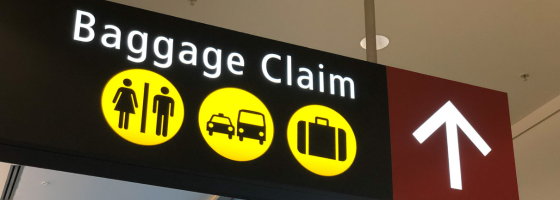15th March 2024
Written on 12th March 2024
The Upside to Mishandled Luggage
An Airline's Liability, Your Entitled Compensation & Steps You Can Take to Avoid Baggage Mishaps
Several different variables affect the outcome of a seamless trip while traveling—cancelations, delays, check in and baggage arriving on time are just a few. What happens when everything goes smoothly but your baggage doesn’t show or arrives damaged? Well, according to the US Department of Transportation (DOT), you may be entitled to compensation.
As detailed on the Air Travel Consumer Report from The Office of Aviation Consumer Protection, of the 362.6 million bags that were checked into direct flights from January to September 2023, 2.25 million bags were lost, delayed or damaged. This statistic encompasses the 10 largest US airlines and their partners, providing evidence that having your bag mishandled may be more common than you think.
Before we discuss airline liability, compensation and steps you can take to avoid mishaps, it's important to note the different types of mishandled baggage—as well as inform passengers on what to do if any of the following baggage situations occur.

Lost Baggage
So, when does an airline officially consider a bag lost? According to the DOT official website, "Airlines may have different policies to determine when a bag is officially lost. Most airlines will declare a bag lost between five and fourteen days after the flight, but this can vary from one airline to another. Whether your bag is declared lost may also depend on the type of itinerary (international vs. domestic), whether more than one airline is responsible for the flight, the airline’s searching mechanism and other circumstances. If an airline unreasonably refuses to consider a bag lost after it has been missing for an unreasonable period of time, the airline could be subject to enforcement action by the DOT."
If your baggage falls under the category as a lost item, be sure to file a baggage claim with your airline as soon as possible.
Delayed Baggage
Airlines are responsible for locating delayed baggage for travelers, should a checked bag not arrive at its destination. The DOT website continues to explain, "Airlines are required to compensate passengers for reasonable, verifiable, and actual incidental expenses that they may incur while their bags are delayed—subject to the maximum liability limits. Airlines are not allowed to set an arbitrary daily amount for interim expenses. For example, an airline cannot have a policy that they will reimburse a passenger up to only $50 for each day that a passenger’s bag is delayed."
Passengers should take measures to file a baggage claim with the appropriate airline as soon as possible, and keep in close communication after filing the claim until their baggage is located.
Damaged Baggage
Passengers may receive compensation for damaged baggage, given the damage did not occur due to improper packing. The DOT notes, "Airlines are responsible for repairing or reimbursing a passenger for damaged baggage and/or its contents when the damage occurs while the bag is under the airline’s control during transportation (subject to maximum limits on liabilities). When the damage to the bag cannot be repaired, airlines will negotiate a compensation amount based on the value of the bag and its depreciation."
Exclusions apply when considering certain categories of items (fragile items, electronics, cash, perishable items, etc.). According to the DOT, exclusions are typically listed in the airlines' contracts of carriage. In addition, passengers may consider purchasing additional insurance for valuable items.
Airline Liability & Compensation
While initially frustrating, should your bag fall under what is considered lost, delayed or damaged by an airline, there could also be an upside—compensation. Compensation for mishandled baggage varies, and also depends on the type of flight—domestic or international.
Under DOT regulation for domestic flights, the maximum liability for mishandled baggage is $3,800 per passenger. While it is not advised to purchase items deemed unnecessary, the airline is "responsible for compensating you for your bags' contents—subject to depreciation and maximum liability limits."
Most international flights differ with liability responsibilities, due to a treaty called the Montreal Convention. According to the DOT website, "The maximum baggage liability for flights covered by the Montreal Convention is currently 1,288 Special Drawing Rights (approximately $1,700.00 US) per passenger. This is the most that airlines must pay a passenger for a lost, damaged, or delayed bag."
Please note that DOT regulations state, "Airlines may require receipts or other proof for valuable items that were in the lost bags."
In addition, there are different liability regulations for any assistive devices. Assistive devices are defined on the DOT website as, "Any piece of equipment that assists a passenger with a disability in coping with the effects of his or her disability. These devices are intended to assist passengers with a disability to hear, see, communicate, maneuver, or perform other functions of daily life." For domestic air travel, airlines are liable for up to the original purchase price of the assistive device, should the device be damaged or lost. If damaged or lost via international air travel, passengers "are subject to the maximum liability limit set by the applicable international treaty."

Steps You Can Take To Avoid Mishandled Luggage Mishaps
While not completely unavoidable, there are steps that you can take as a passenger to aid in avoiding mishandled luggage mishaps, including:
-
Avoid checking a bag, whenever possible. This puts the management of how your bag is handled into your own hands, so you can feel confident that your baggage will get from point A to point B unharmed. Visit TAG's article for carry-on packing tips.
-
Utilize Airtags or similar GPS locator tracking for your baggage. Should your bag go missing or encounter a delay, using a tracking system will help you work directly with the airline to get your belongings back into your hands.
-
Book non-stop flights, whenever possible. Doing so limits the opportunity for your baggage to be mishandled by airlines.
- Snap interior and exterior photos of your baggage, prior to your flight. If your baggage arrives damaged or mishandled, you will have immediate evidence to take to the airline(s).
At TAG, we pride ourselves on providing clients with one-of-a-kind service to help in any unexpected travel situations. Our expert Travel Specialists across the globe do everything they can to ensure you have the seamless trip that you deserve. They work directly with you to arrive at your destination on time and without any hiccups.
Should you have any issues with mishandled baggage, you will need to file a claim with the airline as soon as possible. After your claim is filed, feel free to reach out to your dedicated TAG Travel Specialist for additional support.

